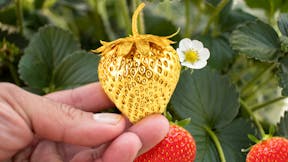Today it is World Soil Day which is celebrated annually on the 5th of December. This day to me at least reconfirms that it is extremely important to take great care of our natural resources. Let’s face it.
In 2050 the earth’s population will be about 9 billion, 70% of whom will then be living in urban areas. These enormous amounts of people need access to healthy and nutritious food. But it is calculated that we have to produce double the amount of food to feed the world. It needs to be produced with half the resources we have access to today. So less soil to cultivate and more mouths to feed. This is one of our biggest challenges. We need to take care of our soil and prevent pollution but also sound water management, use of fertilizers and energy are key to a healthy food production.
Let me highlight the fact that water scarcity alone is addressed as UN’s ‘Agenda 2030’ Sustainable Development Goals. Water management is an important topic for Grodan. Together with Wageningen University & Research we do research to gain efficiencies in water management. If you are interested please take a look at our water management principles in greenhouses.
But back to the issue of land. It goes without saying that the increasing demand on land resources will have a negative impact on the quality of our lands available for food production. We need to take better care of our soil. In the horticulture industry we work together with our partners to produce more with less. We call it precision growing. It is just a modest step in efficient land management.
Soilless cultivation can be part of a broader solution to our challenge of land scarcity. In other words less agricultural land has to be used. And the yield of soilless cultivation when compared to soil based cultivated yield is 15-40% higher. Just some figures that are quite impressive. But at Grodan we fully understand we globally are facing a big challenge in soil management. A broad range of solutions and actions for soil management is required.
I think today’s World Soil Day is a good reminder to us all and definitely for Grodan to stick to our joint ambition to improve efficiencies in soil & water management further. To grow for more people with less resources. I am very much interested in hearing your thoughts. Please share them.




